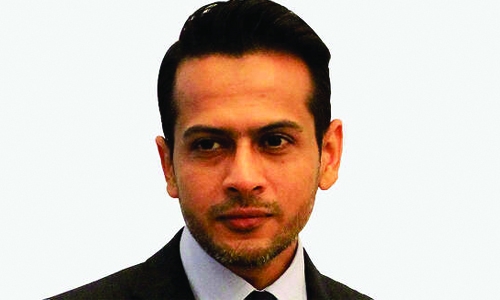‘Blockchain-based payments ideal for Bahrain’
Manama : Bahrain should follow Dubai’s example and implement a blockchain based payments platform to provide the government with instant reconciliation and settlement, according to a visiting expert.
Introducing blockchain technology will dramatically reduce reconciliation time, said Dubai based blockchain expert Waqas Mirza.
Mirza’s company Avanza Solutions was awarded a project by the Dubai government to implement a citywide blockchain based payments platform.
He said that with the implementation of the platform they were able to reduce the transaction reconciliation time from forty-five days to around two hours.
“We have gone live in two government entities, Knowledge and Human Development Authority and Dubai Electricity & Water Authority.
“The project is not meant to go live with a big bang go-live approach where you have 40 entities onboard because that would be a catastrophe, that is why you go step by step, we want to start with two and go from there. Every month we plan to onboard two to three entities and banks, and by the end of 2018 we plan to have the whole city live,” he said.
When asked if Bahrain and other GCC countries should follow the example he said, “They should, it’s not about whether they can or not, they should. There is a lot of efficiencies that come with this, it certainly comes with a lot of benefits.”
Explaining how he achieves the dramatic reduction reconciliation time using blockchain he said: “What we are trying to do is address reconciliation and settlement of government funds. In Dubai, the payment gateway is connected with almost 40 government entities and a dozen banks. For example if a resident pays his electricity bill using the payment gateway it facilitates this transactions, it will debit their bank account and go to the biller for the payment.
“During this process there are a lot of transfer of files between government entities and then the funds are transferred to government entities. The problem is not with the payment from the customer’s side, the customer does not face any issue. However, the problem is with the back-end.
“The problem is reconciliation of books between 40 government entities, the government payment platform and the banks, every party’s books has to match and only then the department of finance release funds to different government entities.
“Today the process is very clunky, it takes the department of finance up to 45 days to tell the government entity about the funds that they have collected on their behalf. The situation is such that there are transactions coming from 40 different government entities with files coming from banks and other parties and the department of finance trying to deal with these files and transactions. This is the problem we are trying to solve with blockchain. We want to bring down these 45 days of friction and wastage to instant reconciliation.”
“In our case all 40 government entities will be connected to our blockchain platform called Cipher and so will the banks. This is how we achieve instant reconciliation through cipher: we ask the government entity to stamp a blockchain node when a transaction is made in addition to stamping in their logs and ERPs.
“When the transaction comes to the payment gateway we ask the gateway to do the same. The transaction is sent to the banks and then it is stamped by the bank as well and the bank sends back an acknowledgement back. So when the transactions has been stamped by all the parties you achieve consensus. What does this do? This eliminates the need for reconciliation. Reconciliation programmes have been written for the past 30 to 40 years to act as a second eye to make sure everyone’s book match but blockchain inherently does that for you. What we do is we reconcile the transaction as and when it happens, eliminating the 40 days of wastage.”
Related Posts

